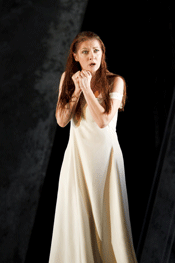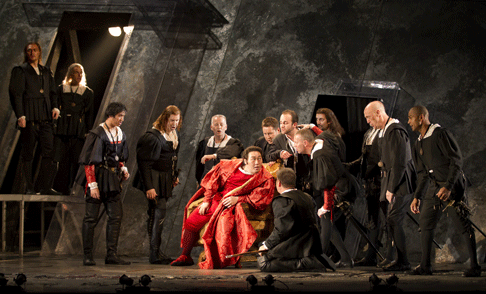The pre-performance
announcement by ROH’s director, Elaine Padmore, of the sad death of this
great soprano added an extra layer of emotional urgency to this revival of
David McVicar’s now almost canonical production of Verdi’s
Rigoletto.
David McVicar’s eighteenth-century Mantua is a hothouse of
Bacchanalian orgies and Machiavellian deceit. Michael Vale’s
Olivier-award nominated sets — transparent, spinning edifices, all
crumbling stone, shadowy recesses and askew perspectives — powerfully
suggest the literal and figurative decay of a city on the verge of moral
collapse, and are complemented by the flaming reds and oranges of Tanya
McCallin’s raunchy costumes for the opening Scene 1 which evoke
Dante’s infernal realms. Nudity and violence, often combined, abound. Out
of these fiery depths leaps a black leather-clad Rigoletto – a horned devil,
spitting fury and curses. Fearlessly physical, Dmitri Hvorostovsky, usually
seen in rather more suave and sophisticated guises, emits a startling
viciousness and ferocity, foreshadowing the inhumanity to which the eponymous
jester’s desire for all-consuming vengeance will subsequently propel him.
Boundless stamina combined with limitless variety — now sweetly tender
when recalling his wife, then cruelly bitter as his obsessive rage engulfs him
— characterise a remarkable performance. Hvorostovsky is not afraid to
push his baritone to its rougher edges, while his ability to spin an endless
lyrical line never ceases to amaze and thrill.
 Patrizia Ciofi as Gilda
Patrizia Ciofi as Gilda
The shadow of the late lamented diva placed a heavy mantle on the shoulders
of Patrizia Ciofi as this production’s Gilda. She took a little time to
settle, occasionally sliding up or slipping down to notes at first, and at
times employing an overly wide vibrato which supported her projection but
muddied the intonation. But Ciofi is an experienced Gilda, well-versed in the
idiom, confident in delivery, and she soon found her focus; her pristine tone
captured the near-hysterical ecstasy of the young girl experiencing the pain of
passion for the first time, and she dispatched ‘Caro nome’ with
aplomb, revealing a true coloratura with seamless passagio. Paul
Constable’s imaginative lighting added some exquisite touches to poignant
moments. Thus at the end of Gilda’s first aria, the stage revolved
casting subtle shadows and revealing subdued corners, as Gilda slowly mounts
the crooked stairs to the attic hovel, her voice heartbreakingly waning with
the fading light. Clothed in virginal white against his darker hues,
Ciofi’s duets with Hvorostovsky were impassioned and penetrating, the
latter’s mastery of the uninterrupted, arching melodic curves of
Verdi’s score suggesting the heartfelt intensity of a paternal love which
both protects and suffocates.
 Wookyung Kim as Duke of Mantua
Wookyung Kim as Duke of Mantua
Korean tenor Wookyung Kim made his debut at the ROH in 2007 as the Duke of
Mantua, and returned to reprise the role. Despite his musical prowess —
unfailingly legato lines and even tone production — theatrically, he does
not make for a natural Casanova. His interpretation is a little one-sided,
fresh naivety not really matched by the requisite careless, even wicked,
wilfulness.
Indeed, many of the cast were veterans of this production, and all held
their own well in the company of the leading lights. The big, bold bass of
Raymond Aceto emphasised Sparafucile’s sinister and twisted motivations.
Mezzo-soprano Daniela Innamorati was a convincingly seductive Maddalena in the
renowned quartet, her warm tone complementing the blending voices. Amid the
ubiquitous debauchery and vice, it was hard for Michael Druiett as Monterone
— who only appears twice in the opera — to make much of a mark as
the voice of moral authority, but he was secure. Both of the Jette Parker Young
Artists in this production also performed with accomplishment: Polish baritone,
Lukas Jakobski, was a solid Ceprano, while the bright baritone of Zhenzhong
Zhou as Marullo made a strong impression in a small role.
The young Israeli conductor, Dan Ettinger, making an impressive Covent
Garden debut, really kept his foot on the pedal from the first downbeat, racing
through the opening scene, injecting a terrifying air of menace, and sustaining
the dramatic drive and frisson of risk and recklessness throughout. The opera
rushed relentlessly on to its disturbing climax: Hvorostovsky’s terrible
exultation over the dead body of his daughter. His perverted elation, in his
belief that the dead Duke lies slain in the sack before him, is a disquieting
moment of hubris.
McVicar presents a dystopian vision of crooked criminality and raw cruelty.
If his vision underplays the balanced contrast between the light and the dark
which, I believe, accounts for much of the emotional piquancy of Verdi’s
opera, in favour of an unremittingly malevolence, it does so with an admirably
precise and sustained focus. A first rate evening.
Claire Seymour
image=http://www.operatoday.com/RIG-2010JP_00584-HVOROSTOVS.gif
image_description=Dmitri Hvorostovsky as Rigoletto [Photo by Johan Persson courtesy of Royal Opera]
product=yes
product_title=Giuseppe Verdi: Rigoletto
product_by=Rigoletto: Dmitri Hvorostovsky; Duke of Mantua: Wookyung Kim; Gilda: Patrizia Ciofi; Maddalena: Daniela Innamorati; Sparafucile: Raymond Aceto; Monterone: Michael Druiett: Marullo: ZhengZhong Zhou; Count Ceprano: Lukas Jakobski; Giovanna: Elizabeth Sikora; Matteo Borsa: Iain Paton. Director: David McVicar. Conductor: Dan Ettinger. Set design: Michael Vale.Costume design: Tanya McCallin. Lighting design: Paule Constable. Royal Opera House, Covent Garden, London. Monday 11th October 2010.
product_id=Above: Dmitri Hvorostovsky as Rigoletto
All photos by Johan Persson courtesy of Royal Opera